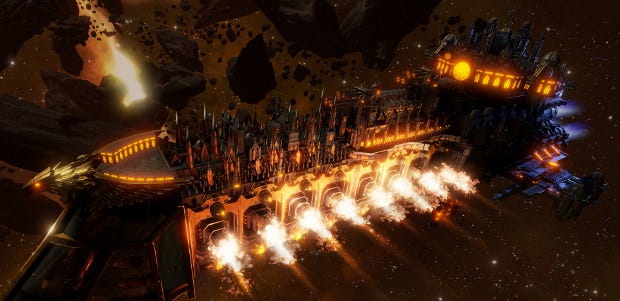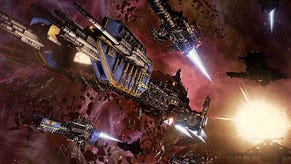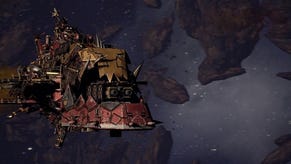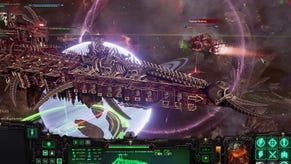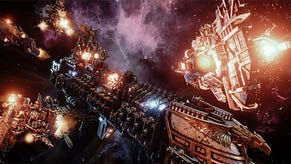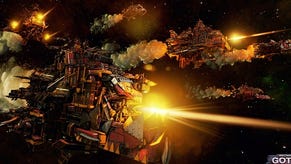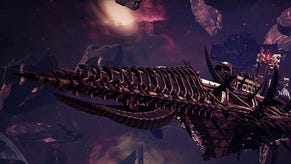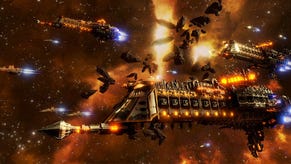First Look: Battlefleet Gothic - Armada
Despoiler warning
The news that an adaptation of Games Workshop's Battlefleet Gothic was in development made for happy reading last week but solid facts were thin on the ground. We knew that the game would be real-time rather than turn-based, which was cause for concern in some quarters, and that four factions would be available. Now, following a meeting with the developers yesterday, I have all of the details necessary to soothe concerns. Armada is packed with clever ideas and I've dissected them below.
How does a dynamic campaign including possible Exterminatus orders on planets that fall under enemy control sound? How about captains with skills that develop over time and personalities that can lead them to disobey orders? Of course, this being the grImperium, anyone showing disobedience to a superior's commands can be executed, restoring order. The chain of events that can lead to an individual execution or a planetwide Exterminatus seem like they're key to an understanding of the game Tindalos are hoping to make. Armada isn't aiming to be a direct digital adaptation of the Battlefleet rules but it won't be a linear RTS wearing borrowed insignia and uniform from a popular mythology.
The two aspects outlined above - the possible fates of planets and of captains - help to explain how campaign and combat will work, and how they'll capture the flavour of Warhammer 40k.
First, let's cover combat. It's realtime, with no turn-based option, but the pace will be slow enough to allow for careful planning, as befits the hulking great ships that are at the heart of the game. Naval battles are the inspiration, so manoeuvring into position to launch broadside attacks or ramming or boarding actions will be more important than being able to monitor and operate hundreds of weapon systems simultaneously. Apart from your Admiral's ship, every vessel in your fleet will respond to the changing situation during a mission without waiting for commands from on high. While you can directly intervene, the fleet should be able to handle itself thanks to a set of behaviours assigned before battle commences.
You'll choose those behaviours yourself, and can alter them mid-mission if necessary, which should provide a sense of control without the need for rapid micromanagement. As an example, Tindalos showed a set of disengagement options, instructing a captain to pull out of combat when his ship had taken a certain amount of damage. Perhaps you want him to disengage early because you've spent a fortune upgrading his weapons systems, or because the crew are particularly talented and should definitely live to fight another day. Whatever the case, as soon as the threshold is reached, he should activate his warp drive and scarper.
A particularly brave captain might refuse the order, however, insisting that his crew be reduced to space dust rather than retreating. At this point, you have a choice - allow him to follow his dreams of glory/death, or put your foot down and force obedience. If you choose the former course, dissent within the ranks will grow and other captains will become more likely to rebel against orders, but if you rattle the chain of command, a 'Blame' point will be assigned to the captain. If he accrues three, he's for the chop, publicly executed to set an example. All glory to the Emperor.
Executing a captain means that all of his experience and skills are lost, which is a bad thing. But, on the flip side, all dissent vanishes when an execution takes place, so all other captains should be a little more obedient, at least for a while. It's not clear how many personality types the final game will contain but the friction between player-set behaviours and occasional disobedience should make the scale of battles easier to manage while ensuring there are difficult choices to make as conflict develops.
The campaign map should offer something similar - difficult decisions, along with fleet management, rather than linear progression. It's a dynamic simulation of the war for the Gothic system. All four factions will be in play - Eldar, Ork, Imperium and Chaos - but while all are available in multiplayer and skirmish modes (the latter not yet confirmed but likely), players will always control an Imperial fleet. There'll be a two player cooperative option as well as the single player mode, and the campaign map is dynamic, with non-player Imperial fleets in action alongside the invading forces.
Rather than gathering territory and expanding your power, the main objective at the beginning of the game will be to defend what is already yours. The whole system is under Imperial control when the game begins and you'll be zipping about in an attempt to protect planets from the three enemy factions. If a planet does fall under the control of the Orks, Chaos or Eldar, the Imperium might set a date for Exterminatus, destroying the entire population and removing any resources generated by the territory out of the game. Movement on the campaign map is turn-based and once an Exterminatus order is set, a turn timer will tick down next to the planet. If you don't reclaim it before the timer hits zero, it'll be eliminated.
Armada's end-game concerns Abaddon the Despoiler and his Black Legion, and there will be specific missions that relate to understanding and vanquishing the Chaos fleet, but the other factions will have their own story missions as well. While they won't be playable during the campaign, multiplayer will support all four factions and just as in single player, your fleet can be customised and will be persistent from one battle to the next. Characters gain experience and skills, and ships can have new equipment added, including weapons and other subsystems. There'll be around sixty possible upgrades for ships and, deliciously, Chaos vessels can use any Chaos Mark to alter the appearance and abilities of their vessels.
During combat, specific systems can be damaged, disabled and targeted, and repairs will cost either money or require time out of the fray. If a ship's warp-drive is knocked out, it'll be unable to escape combat but if disaster does strike, the crew can be evacuated. There's another difficult decision to be made - abandon an expensive ship to save a talented crew, or hope they can hold out until the tide of battle turns in your favour.
While boarding actions are possible, ships cannot be captured. Sending in the marines is a method of taking down overpowered ships without trading broadside blows - scuttling rather than stealing. Like everything else discussed, Tindalos backed up their decision with reference to the original tabletop game and the fiction of 40k. Whether they'll succeed in all their ambitions is impossible to say and the game won't be released this year, but their passion for and knowledge of the license isn't in any doubt. Thankfully, they're unwilling to use the license as a crutch to prop up a reskinned RTS.
It's early days. I've only seen a basic prototype of two fleets in battle and mock-ups of the campaign screens, but Armada has enough good ideas and smart mechanics to be a great space strategy game, regardless of the license. Chaotic cathedral ships might well be the icing on a particularly delicious cake.
